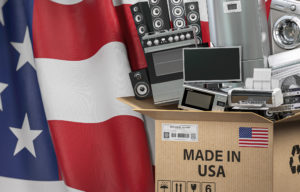News & Insights
CBP Implements New Enforcement Policy for Wood Packaging Material Requirements
As of November 1, 2017, U.S. importers and carriers may find themselves subject to civil penalties imposed by Customs and Border Protection (“CBP”) for violations of the wood packaging material requirements. Previously, CBP allowed up to five (5) violations before taking action. That is no longer the case, and civil penalties may be assessed for each wood packaging material violation. CBP may assess liquidated damages against responsible parties in some cases, as well.
By way of background, the U.S. Department of Agriculture (“USDA”) adopted the international standard for wood packaging materials approved under the International Plant Protection Convention (“IPPC”) in 2004 to decrease the risk of introducing plant pests (i.e., potentially injurious wood-boring pests) into the United States. As a result, wood packaging material imported into the United States must either be heat treated or fumigated with methyl bromide, and marked to certify that they have been treated. Most wood packaging materials are covered by this rule, such as wood pallets, crates, boxes, and pieces of wood used to support or brace cargo. However, manufactured wood materials, loose wood packing materials, and wood pieces less than 6mm thick in any dimension are excluded from the requirement.
The wood packaging requirements allow for two types of treatment options: heat treatment or fumigation with methyl bromide. For heat treatment, wood packaging materials must be heat treated to achieve a minimum wood core temperature of 56°C for a minimum of 30 minutes. For fumigation, the wood packaging materials must be fumigated with methyl bromide in an enclosed area for at least 16 hours at the regulated dosage and then must be aerated to reduce the concentration of fumigant below hazardous exposure levels.
After either of these treatments, the wood packaging materials must be marked in a visible location on each article, preferably on at least two opposite sides of the article, with a legible and permanent mark approved by the IPPC to certify that it has been subjected to an approved treatment. Marks will vary by country and treatment establishment, but must include the IPPC trademarked graphic symbol, the ISO two-letter country code for the country that produced the wood packaging material, a unique number assigned by the national plant protection agency of that country to the producer of the wood packaging material, and an abbreviation disclosing the type of treatment. Once the wood packaging materials are properly treated and marked by an approved treatment facility in any country, the mark will be accepted as proof of compliance for the life of the wood packaging material.
If wood packaging materials enter the United States unmarked or are found to be inappropriately marked, they will be presumed to be untreated and therefore non-compliant. In addition, marked wood packaging materials that are found to be infested with a named pest will be presumed to be untreated and non-compliant, as well.
The party responsible for non-compliant materials must comply with the Emergency Action Notifications (“EANs”) issued by CBP and ensure that they are immediately exported—no other form of remediation (e.g., fumigation, etc.) will be allowed. Failure to act as directed by an EAN may lead to the imposition of liquidated damages against a party whose customs bond obligated compliance with the wood packaging requirements. CBP may also assess civil penalties against a party attempting to import non-compliant wood packaging materials. Civil penalties may be assessed for cases involving fraud, gross negligence or negligence under Section 1592 or for aiding an unlawful importation under Section 1595a(b) of the Customs Regulations. As noted above, CBP previously allowed up to five (5) violations before it imposed civil penalties against the responsibility party. However, as of November 1st, civil penalties may now be assessed for each violation that occurs.
U.S. importers should take note of the new enforcement policy of CBP, and ensure that they are in compliance with the wood packaging requirements. Companies may want to consider utilizing plywood materials, press board, plastic pallets, and other alternatives materials to avoid the increased risks posed by wood packaging materials.
If you have any questions pertaining to the wood packaging materials, customs compliance or other international trade issues, please contact Melissa Proctor at Miller Proctor Law PLLC (melissa@millerproctorlaw.com).
News & Insights

U.S. Export Restrictions on Huawei: Timeline of Events and Latest Updates
Many questions have been swirling around as of late as to the current status of U.S. export restrictions on Huawei following President Trump’s comments at the G-20 summit. The following provides a timeline of events and an update on the

Petition Requests FTC to Issue Made in the USA Regulations and Impose Civil Penalties on 1st-Time Violators
Truth In Advertising, Inc. (truthinadvertising.org) (hereinafter “TruthinAdvertising” or “the Petitioner”) submitted a petition to the Federal Trade Commission (“FTC”) on August 22, 2019, requesting that the agency issue regulations that would allow for the imposition of civil penalties on first-time


